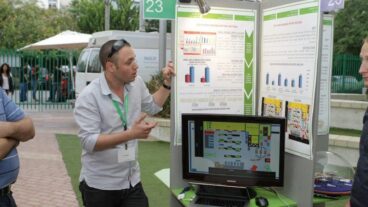Stem cell research in Israel is less controversial than in many countries, since Jewish traditions related to the beginning of life differ from beliefs held by Christians. It was an invitation that highlighted the prominence Israeli scientists enjoy in the field of stem cell research: several Israelis were recently summoned to lecture at a stem cell conference at the Los Angeles-based hospital, Cedars-Sinai Medical Center, which ranks among the top research hospitals in the nation.
California has become the US epicenter for stem cell research, so it was a natural setting for Israeli academics, US scientists and investors to meet. Israeli researchers at the conference included Dr. Joseph Itskovitz-Eldor, of the Technion and Rambam Medical Center who was part of the team that first isolated stem cells from human embryos in 1998; developmental geneticist Dr. Nissim Benvenisti from Hebrew University, who helped organize the event and Daniel Offen of Tel Aviv University, who was among the stem cell researchers asked to share their recent findings.
“The response was very good and on the clinical side, several LA surgeons already spoke about collaborating with us,” said Offen, whose work is being commercialized through BrainStorm Cell Therapeutics. “I talked about our developments in taking stem cells from human bone marrow and how we induce them to become neural-like cells for treating Parkinson’s disease,” he told ISRAEL21c.
Many investors were present at the meeting, because unlike other areas of academic research, the clinical trials and medical expertise involved in advancing stem cell research is a costly business.
“It is a pleasure for me to combine business with research and science,” commented Offen who said he could never fulfill his vision without the help of business. “If we don’t make this business-academic combination we wouldn’t be able to apply our research and bring good to humanity. Academic grants are not enough to do good research.”
It has only been two weeks since the meeting, and Offen, who has a collection of business cards from potential investors waiting for follow-up, has a California delegation hot on his tracks back in Israel. A group of California officials will be in Israel this week to meet with BrainStorm, according to acting CEO Yoram Drucker. Among the VIPS are state senators George Runner and Joe Simitian.
BrainStorm is just one of the Israeli companies harnessing stem cells to find a treatment for Parkinson’s disease. Parkinson’s, which affects 1.5 million Americans every year is caused by the selective death of a cluster of nerve cells. The cells go on to secrete dopamine, a chemical which works to control the motor cortex, and eventually leads to a complete dysfunction of the muscles.
Recently, BrainStorm announced that they had successfully withdrew stem cells from a brain of a rat in which Parkinson’s disease had been induced, sorted them into cells that produce a protein called GDNF, and implanted them back into the rat’s brain. The rat’s symptoms improved by 60% within three months.
The new trial represents significant progress for the company, which three months ago, first announced that it had sorted stem cells from bone marrow into GDNF-producing cells. GDNF encourages nerve cells to grow and send dendrites, which communicate with other nerve cells and body organs.
BrainStorm plans to begin human trials in six months, before which it must pass a number of additional milestones in animal trials. There is currently no curative therapy for Parkinson’s, and groups such as the Michael J. Fox Foundation in the US are hoping to speed up the development of research. BrainStorm’s chief medical advisor, Prof. Eldad Melamed, Head of Neurology at the Rabin Medical Center is the only-non-American member of the foundation.
Another Israeli company, Cell Cure, a commercial entity of Hadassah Medical Center, hopes to build a cell therapy that will generate dopamine-making neurons in the brain and thus treat the effects and ongoing damage from Parkinson’s. Cell Cure says they were the first to show how transplanted human embryonic stem cells work in animal models with Parkinson’s disease.
It’s no surprise that with developments taking place in companies like BrainStorm and Cell Cure, there has been so much international interest in Israeli stem cell research.
The field in Israel is less controversial than in many countries, since Jewish traditions related to the beginning of life differ from beliefs held by Christians. This enables Israeli researchers to forge ahead with research involving embryonic stem cells, when similar research is still being debated in the United States and elsewhere.
“Unlike the Catholic view that places the beginning of a human life at the moment of conception, Judaism believes that human rights are acquired progressively. Traditional sources regard the fertilized egg and sperm as ‘water-like’ material until after 40 days,” said Prof. Michel Revel who represents Israel at UNESCO’s bioethics committee.
Still, ethics are a concern, which is why Revel was among those who discussed the topic at a recent bioethics conference entitled ‘Creating in God’s Image’ which was held in Israel at Bar Ilan University in conjunction with Columbia University.
Researchers discussed the ethical challenges of screening for in-vitro fertilization and the use of stem cell lines created for stem cell research. Leading US doctors in the stem cell area such as Dr. Gerald Fischbach from Columbia University, and Dr. Mark Hughes from Michigan described the ethical challenges in their work. Discussions were held between doctors and rabbis like Dr. Moses Tendler, who believe that all decisions involving stem cell research should be make carefully.
Tendler believes that there are some areas where embryonic stem cell research is necessary, such as finding a cure for Parkinson’s while that there are certainly other areas – trying to cure baldness, for example, which are frivolous.
“Looking for a cure for baldness shouldn’t be done while we have the hope for curing Alzheimers, diabetes and Parkinsons,” he said.
But generally, the rabbinical establishment has been supportive of stem cell research, and Israel’s Moslem community is in line with Jewish thought with regards to the stem cell debate. Moslems believe that ‘ensoulement’ – the time when an embryo becomes a human being – occurs at day 120.
Despite the liberal atmosphere in Israel regarding stem cell research, and neither government policy nor the views of the majority in Israel may not be obstacles for current Israeli research, some companies prefer to avoid the debate altogether by only using stem cells culled from a patient’s own bone marrow, umbilical cords, and placenta instead of embryonic cells. Often, their caution stems from the need to to take into considerations the views of other cultures as they seek investors in the global marketplace, or seek to cooperate with government entities in countries who have difficulty with stem cell research.
But other companies, such as Cell Cure, believe that the benefits of the treatments they are developing mean that there is no moral dilemma when it comes to forging ahead.
Prof. Tamir Ben-Hur, a medical doctor and neurologist at Hadassah who works with Cell Cure, doesn’t see any ethical problems in using human embryonic stem cells, “I am not religious, but in this case, I very much see eye-to-eye with the Jewish approach as to when life begins and I do not think a fertilized egg is life that needs to be salvaged.”
In Israel, cell lines are usually derived from couples who go to fertility treatment, and after 7 years, a couple is given the option to donate their frozen embryos for research purposes. All of the frozen embryos are organized in hospitals, with clear registration.
It may take a few years, but both BrainStorm and Cell Cure are certain that a stem cell therapy treatment for Parkinson’s is well on its way. Based on their projections, a whole host of other diseases may also be alleviated as well.












